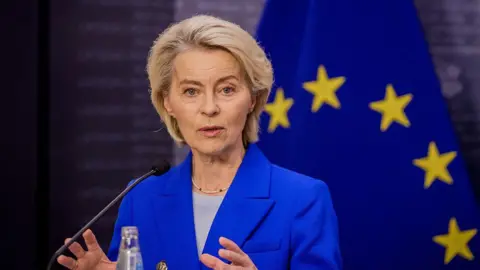In a politically charged atmosphere, European Commission President Ursula von der Leyen successfully navigated a confidence vote initiated by a far-right faction in the European Parliament, signaling a temporary victory in her leadership journey. The vote, an unusual parliamentary procedure, was not entirely unforeseen, reflecting challenges in von der Leyen's camp just one year into her second term.
The motion required the backing of two-thirds of the total 720 Members of the European Parliament (MEPs) – a tall order that ultimately fell short, with only 175 MEPs in favor while 360 opposed and 18 abstained. Romanian MEP Gheorghe Piperea spearheaded the motion, accusing von der Leyen of lacking transparency, particularly over her communications during negotiations for COVID-19 vaccines. The allegations invoked concerns about democratic principles, declaring that her Commission could not demonstrate sufficient accountability.
In the heated debate preceding the vote, von der Leyen dismissed her accusers, labeling them as “conspiracy theorists” and asserting that the claims surrounding her dealings with Pfizer were unfounded. She expressed frustration towards her adversaries, characterizing them as "extremists" and criticizing their connections to anti-vaccination sentiments and pro-Russian rhetoric.
Although she managed to rally support from key political blocs, including her own centre-right European People's Party (EPP), the petitions from various groups highlighted cracks in her leadership. Tension arose particularly from within the ECR group, where relationships with figures like Hungarian Prime Minister Viktor Orban further complicated alliances. Notably, the Italian Brothers of Italy party, which has allied with von der Leyen, opted against the motion, showcasing the diverse political landscape she operates within.
Even in her triumph, whispers of dissent lingered, with EPP members publicly urging von der Leyen to distance herself from far-right alliances and reclaim control over the party's narrative. Leaders from opposing factions within the Parliament remain critical; Iratxe García from the Socialists & Democrats (S&D) emphasized that their backing did not equate to endorsement of all her policies, particularly those perceived as far-right friendly.
As the confidence vote occurred, von der Leyen participated in the Ukraine Recovery Conference in Rome. Post-vote, she reaffirmed her commitment to European values through a social media message: "As external forces seek to destabilise and divide us, it is our duty to respond in line with our values." Her resilience in the face of political pressure indicates that while she has weathered this storm, the ongoing challenges surrounding her leadership may not be over.
The motion required the backing of two-thirds of the total 720 Members of the European Parliament (MEPs) – a tall order that ultimately fell short, with only 175 MEPs in favor while 360 opposed and 18 abstained. Romanian MEP Gheorghe Piperea spearheaded the motion, accusing von der Leyen of lacking transparency, particularly over her communications during negotiations for COVID-19 vaccines. The allegations invoked concerns about democratic principles, declaring that her Commission could not demonstrate sufficient accountability.
In the heated debate preceding the vote, von der Leyen dismissed her accusers, labeling them as “conspiracy theorists” and asserting that the claims surrounding her dealings with Pfizer were unfounded. She expressed frustration towards her adversaries, characterizing them as "extremists" and criticizing their connections to anti-vaccination sentiments and pro-Russian rhetoric.
Although she managed to rally support from key political blocs, including her own centre-right European People's Party (EPP), the petitions from various groups highlighted cracks in her leadership. Tension arose particularly from within the ECR group, where relationships with figures like Hungarian Prime Minister Viktor Orban further complicated alliances. Notably, the Italian Brothers of Italy party, which has allied with von der Leyen, opted against the motion, showcasing the diverse political landscape she operates within.
Even in her triumph, whispers of dissent lingered, with EPP members publicly urging von der Leyen to distance herself from far-right alliances and reclaim control over the party's narrative. Leaders from opposing factions within the Parliament remain critical; Iratxe García from the Socialists & Democrats (S&D) emphasized that their backing did not equate to endorsement of all her policies, particularly those perceived as far-right friendly.
As the confidence vote occurred, von der Leyen participated in the Ukraine Recovery Conference in Rome. Post-vote, she reaffirmed her commitment to European values through a social media message: "As external forces seek to destabilise and divide us, it is our duty to respond in line with our values." Her resilience in the face of political pressure indicates that while she has weathered this storm, the ongoing challenges surrounding her leadership may not be over.




















